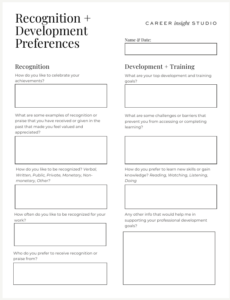Curious why that heartfelt pat-on-the-back didn’t quite land as expected? It all begins with asking! This post provides tips for understanding what form of recognition and development truly resonates with your team, so you can motivate them to boost morale and impact.

In today’s fast-paced world, recognizing your team’s efforts and providing avenues for growth isn’t just a nice-to-have—it’s absolutely critical! As work demands amplify, it’s becoming clear that personalized recognition and clear career pathways do more than just lift spirits—they help foster a culture where people actually want to stick around and contribute. A study by Workvivo, claimed 81.9% of employees would be more motivated to succeed at work if they received recognition.
That being said, it’s not just enough to offer a one size fits all recognition program. Not every employee gets pumped about the usual accolades. So, what really lights a fire under our team members? You might be surprised, but it often starts with something as simple as asking them!
Decoding What Drives Us
Here’s a little nugget of truth: while putting in the effort at work is expected, acknowledging someone’s above-and-beyond hustle can seriously elevate their motivation and loyalty. Over my career, I’ve received a variety of thoughtful tokens of appreciation. And while I’ve cherished each gesture, the impact really depended on how well the giver knew what makes me tick. Sure, it’s the thought that counts, but just imagine the boost when the gift hits the mark—like a Starbucks card for a caffeine aficionado, or an extra day off to actually enjoy that latte. Trust me, those are the kinds of perks that can make my day! 😉
Twice a year at work, we dive into survey data that shine a light on how our employees feel about a whole slew of topics. When it comes to recognition and development, the goal is to understand whether our team members feel nurtured in their career paths and if their contributions are being noticed. No surprise, this continues to be a challenge for many in the organization. Big shoutout and credit to our leaders (Jessica & Danna) for trying different approaches to understand what would make a positive difference when it comes to recognition and development.
Customized Recognition

In order to understand what was meaningful for our teams, we were encouraged to engage one-on-one to understand what makes each person feel valued, recognized and to surface meaningful development opportunities. Download this free one-page template to capture the following info:
Recognition:
- How do you like to celebrate your achievements?
- What are some examples of recognition or praise that you have received or given in the past that made you feel valued and appreciated?
- How do you like to be recognized? Verbal, Written, Public, Private, Monetary, Non-monetary, Other?
- How often do you like to be recognized for your work?
- Who do you prefer to receive recognition or praise from?
Development, Training and Learning Areas
- What are your top development, learning & training goals?
- What are some challenges or barriers that prevent you from accessing or completing learning?
- What types of learning do you find most effective and engaging? Online, In-person, Self-paced, Instructor-led, Other
- How do you prefer to learn new skills or knowledge? Reading, Watching, Listening, Doing
Four-Step Strategy to Enhanced Engagement
Once you’ve gained this insight, you’ll be well-equipped to motivate and encourage your team in ways that are both personal and impactful.
- Immediate and Specific Recognition: It might seem like a no-brainer, but don’t just wait around for the annual review to give a shoutout for good work. Giving immediate praise that’s specific to actions contributing to team goals not only boosts morale but also reinforces a culture of achievement.
- Development and Growth Opportunities: Providing chances for professional growth not only aligns with your team’s career ambitions but also ramps up their engagement and loyalty. Knowing their aspirations will help you connect the dots on stretch assignments, professional development and skill-building opportunities.
- Continuous Feedback and Performance Management: Think of regular feedback like routine maintenance for a well-oiled machine. Keeping the lines of communication open aligns everyone with the organizational goals and cultivates a proactive work environment.
- Utilizing Non-Financial Rewards: Look beyond the paycheck. Opportunities for upskilling, taking on leadership roles, or gaining more independence can significantly ramp up motivation, showing your team that there’s additional ways to enrich their work life beyond monetary measures.
Here’s a recent Forbes article that provides additional tips for motivating employees.
Integrating these practices can help cultivate a workplace where team members feel genuinely recognized and connected. This isn’t just about building a team; it’s about creating a community of motivated professionals eager to contribute their best.
How do you engage and motivate your team? Anything you would add? Share your experiences in the comments below!
thanks for reading! xx




Once again- you nailed a critical leadership skill. Every time I am with you, I am always inspired and learn so much. I have now printed the worksheet and I will be doing some interviews with this in mind.